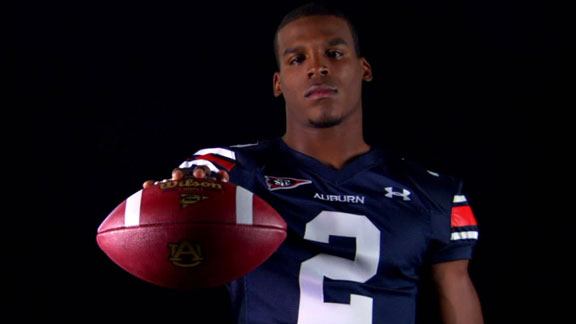The Auburn Tigers are in trouble again though I'm not sure I'm all that surprised.
According to ESPN's Chris Low, four former Auburn football players said they received thousands of dollars in cash from boosters from not just Auburn but other schools as well.
 "Somebody came to me, I don't even know this person and he was like, 'we would love for you to come to LSU and he gave me a handshake and it had five hundred dollars in there," said Stanley McClover one of the players who alleges being paid by the Tigers.
"Somebody came to me, I don't even know this person and he was like, 'we would love for you to come to LSU and he gave me a handshake and it had five hundred dollars in there," said Stanley McClover one of the players who alleges being paid by the Tigers.An HBO special, set to air tonight, talks about McClover along with Chaz Ramsey, Troy Reddick and Raven Gray being paid as part of a pay-for-play at Auburn University.
This news has once again started a debate about whether or not players should be payed, legally, to play the game. Those who are for it seem to only want to pay the top recruits. What they don't understand is the snowball affect it would cause.
Let's start out with the fact these athletes, at least the best recruits in each sport, are given full ride scholarships to these schools. According to a USA Today report, an athletic scholarship in some of the top FBS schools holds an average value of $27,923.
That same report also says the players are also given complimentary tickets to family and friends, tutoring, and other academic support.
Here's where the argument takes a turn that most either don't or refuse to think about. You can't start a "pilot program" to only a certain amount of universities and pay just a few select players.
The moment schools start paying players is the moment a court battle ensues over why they aren't paying every student athlete on campus.
All the talk right now surrounds college football athletes. Whether it's Auburn, Ohio State, USC, or any other school around the country, this is where the conversation currently lies. Sure there will be media members who will tell you it's time to start paying athletes, but the "athletes" they're referring to are football players.
They won't tell you softball, volleyball, track and field, and other sports we may not think about should be paying their athletes. You won't find one major name in media saying something like that on Twitter or anywhere else.
Here's another part of the argument. How many schools can really afford to pay their players? Half? A quarter of them, perhaps?
Most schools wouldn't have to kill off other sports just to be able to afford what most are talking about. Is that fair to the athletes who went from having a full ride scholarship in their respective sport to scrambling just to be qualified for student loans?
We can debate this topic all we want but it's not something that will ever happen and for one simple reason. The moment universities start paying players in one sport or two, there will be a court battle that will ensue because you can't just pay this sport or that sport and not pay all the rest.
Schools don't have the money for this and the NCAA will never put this into affect. The USA Today report I cited earlier made a great point. If you start paying these players they go from students to employees.
It sets a dangerous precedence colleges don't want to even approach.
The one question no one has been able to answer, no matter how many times it's asked, is how much do you want to pay these athletes. On top of the scholarships, worth roughly $30,000 per year, how much are you wanting to pay them?
That's a question which may never be answered. There will never be a dollar amount put on the value of the average college athlete.
The moment that happens is the moment the college experience changes forever.
Follow Todd Kaufmann @T_Kaufmann on Twitter or find him on Facebook
No comments:
Post a Comment